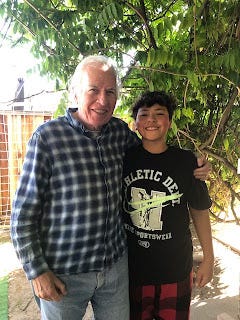(This is the second in a series. Read Part One.)
I left CIR in 1989 to resume my career as a magazine editor, becoming bureau chief for California magazine. We did some big stories there, too, but our Australian owner shut us down without warning one day; and two days later I was named Investigative Editor at Mother Jones. We did a lot of good stories over the next two years there, but it came time for me to leave, even though I wasn't sure where I would go next.
My old friend Raul Ramirez was leaving his post at KQED-FM for six months to go to Harvard as a Nieman Fellow, and asked me if I would fill in for him. This was my first taste of public radio news, one of the best venues a journalist could find, and I truly loved it there.
When Raul came back, I was ready to jump to the newspaper business, but the president of KQED made me an offer I couldn't refuse, so I moved "upstairs," bought some suits, and became an instant executive. Another half-year and I was named Executive Vice President for KQED Inc.
I enjoyed this new work, including an extremely long, slow negotiation with the union representing the station's technical workforce. It was both the details and the big picture of helping run a company important in our community that attracted me at that point in my life.
That job came to a sudden end due to internal politics and external economics, however -- so it was a transition I didn't see coming. The media world was undergoing an historic transformation and I would change with it.
(Part Three tomorrow.)
HEADLINES:
Trump Trial Live Updates: Hope Hicks Delivers Emotionally Gripping Testimony Before Trial Adjourns for Weekend (NYT)
Hope Hicks, ex-Trump adviser, recounts political firestorm in 2016 over ‘Access Hollywood’ tape (AP)
NYPD takes dozens more into custody as police continue facing off with protesters nationally (WP)
US anti-war student protests and police raids shake up schools’ graduation plans (Reuters)
Sudden surge in sea level rise threatens the American South (WP)
Orangutan in the wild applied medicinal plant to heal its own injury, biologists say (NPR)
U.S. Accuses Russia of Using Chemical Weapons in Ukraine (NYT)
China launches moon probe as space race with US heats up (CNN)
Call the campus protests what they are (WP)
“Mrs. Doubtfire” Child Stars Reunite Over 30 Years After Movie's Release: 'Still Feels Like Family' (People)
It looks like OpenAI is about to make Google’s worst nightmare come true (BGR)
Rabbit vs. Meta Glasses vs. Humane: Finding a Usable AI Gadget (WSJ)
Stanford AI leader Fei-Fei Li building 'spatial intelligence' startup (Reuters)
Everyone On Camping Trip Just Gets Out Of Way While Friend Who Knows What He’s Doing Takes Care Of Everything (The Onion)
